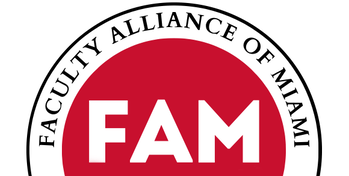Back in Fall of 2020, 95% of faculty voted to support the AAUP’s two-part Faculty Assembly Resolution on Shared Governance. Sadly, the Board of Trustees has now declined to take action on either of the Resolution’s requests to improve shared governance. It first refused to support adding faculty as nonvoting members. Now, it has decided that Miami’s shared governance practices already align sufficiently with the national Statement on Governance of Colleges and Universities. The Provost has assured the Board that Miami’s shared governance practices “exceed” the norms outlined in the Statement.
Miami’s practices are in fact out of line with the Statement. So this result is disappointing, but not unexpected. And in a number of ways it is a win for Miami faculty.
First, the Faculty Assembly Resolution made shared governance a topic of regular attention at Senate and beyond. We have set a much-needed higher bar for shared governance at Miami.
Better yet, the Provost has publicly acknowledged the Statement as an important set of recommendations approved by the Association of Governing Boards. That is a good thing, especially as we are not sure the Provost, President or Board knew of the Statement before we brought it to their attention.
Best of all, Chair David Budig confirmed that the Statement is “an excellent framework to help institutions shape effective shared governance systems.” While most Miami faculty disagree with Budig’s assertion that “shared governance systems are sound and in clear conformity” with the Statement, it is excellent news that the Board believes that the Statement should guide shared governance practices at Miami.
This is an important win. The Board-endorsed Statement can serve as a strategic bulwark against further erosions to shared governance. And faculty can use it to identify Miami practices that need reform, building better systems on its foundation.
Details on the Provost’s Report to the Board
At the May 13 meeting of the Board’s Academic and Student Affairs Committee, Provost Osborne reviewed the ACE/AAUP/AGB Statement on Government, noting that it recommends joint effort, division of responsibility by expertise, and delegation of academic/educational matters to faculty. His summary of the Statement was accurate and thorough and generally aligned with AAUP Miami’s discussions of the statement (see here and here).
His conclusion was more troubling. His claim that Miami’s practices not only align with, but “exceed” shared governance norms was based on the fact that faculty spend many hours participating on college, departmental and Senate committees. He referred to “broad & consistent inclusion of faculty, staff and students” in governance processes and on “focused use of task forces and committees to complement the extensive work of standing committees.”
Faculty have heard these arguments before. Faculty know that shared governance means genuine participation in decisions concerning the educational mission — the area for which, according to the statement, the faculty have expertise and responsibility. At Miami, “shared governance” instead often means handling detail work and implementation for decisions already made at the top.
Miami’s practices are not, in fact, adequately aligned with the Statement, and the Provost’s glowing report meant that the Board did not hear about areas where Miami is out of line with the Statement. For example:
- Miami does not have a regular “agency…for the presentation of the views of the whole faculty,” as the Statement requires. Senate is not such an agency as it consists of students, staff, upper administrators and faculty. Faculty Assembly is headed by the president and faculty do not normally have input into the agenda. Meetings are typically a series of reports. Motions are not entertained and discussion is not invited.
- The Provost’s report mentioned Faculty Rights and Responsibilities Committee (R&R) as evidence of thriving shared governance. But R&R’s recommendations have so often been ignored that it is evidence of the opposite. The Statement is clear that in matters related to faculty status, “the power of review or final decision lodged in the governing board or delegated by it to the president should be exercised adversely only in exceptional circumstances, and for reasons communicated to the faculty.” At Miami, decisions adverse to R&R’s conclusions are more the norm than the exception, and adequate reasons are not being shared with the committee.
- Faculty should retain power over policies on faculty status, according to the Statement—but Miami’s board recently declined to formally delegate decisions on tenure policy to faculty.
Miami faculty, we have made important progress, but there is a lot left to do. Let’s keep pushing in Senate and elsewhere to improve shared governance at Miami.
*As reported to Miami Senators at the Senate Retreat on August 17, 2021.


Leave a Reply